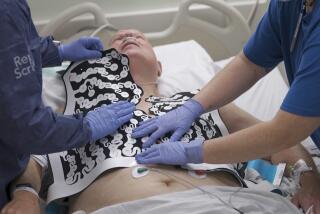Insurer to Reimburse Cost of Non-Surgical Heart Care : Health: Therapy uses diet, exercise, meditation. Approval reflects new emphasis on preventive medicine.
- Share via
The use of alternative treatments for serious illnesses got a major boost Tuesday when one of the nation’s largest health insurers said it would reimburse the costs of a non-surgical therapy for heart disease.
The therapy, which uses a vegetarian diet, exercise, meditation and support groups to reverse the disease, was developed by Dr. Dean Ornish, an internist and director of the Preventive Medicine Research Institute in Sausalito.
Mutual of Omaha Insurance Co., which provides coverage for about 10 million individuals, said it would reimburse several hundred patients for the $3,500 cost of participating in pilot programs that will test Ornish’s therapy, which supplants the need for surgery or drugs.
It’s the first such alternative remedy for heart disease to qualify for insurance coverage, said Terry Calek, senior vice president of public affairs for Mutual of Omaha.
“This isn’t only a pilot program for coronary artery disease, it’s a pilot for medicine in general,” said Dr. Kenneth McDonough, Mutual of Omaha’s medical director.
Indeed, Mutual of Omaha’s novel step signaled that insurers are starting to place a significant value on unconventional therapies for certain ailments.
Mutual of Omaha also might soon be followed by other carriers. Ornish, according to Calek, said several other major insurance companies are considering plans to provide similar reimbursement. They reportedly include the Blue Cross and Blue Shield companies of California.
Calek said Mutual of Omaha embraced the program because “it points to a collective type of arrangement between insurers, (health) providers and the patients, because the patients have to be very involved in this program.”
“What Ornish’s program has done is prove that this actually provides you with an alternative to more costly and invasive types of treatment,” she said. In the Omaha area, she noted, typical coronary bypass surgery costs between $30,000 and $40,000.
Mutual of Omaha’s decision, in fact, extends one of the major trends already occurring among health insurers: The push toward health maintenance organizations (HMOs) and other so-called managed-care programs that try to cap the rising costs of coverage by promoting regular checkups and other preventive wellness plans.
McDonough said his company also decided to cover Ornish’s pilot program because he has documented its success.
Ornish said that the pilot programs will run for two years in Omaha and five other sites to see if the therapy is practical and effective. Previous studies have shown that patients using the therapy had less chest pain and their coronary arteries were less blocked, he said.
Participants eat a vegetarian diet low in fat and cholesterol, exercise moderately, manage their stress with meditation and attend a support group. That three-month program is then followed by a 40-week maintenance program that includes weekly support meetings.
Ornish has been asserting for some time that such a therapy can replace heart patients’ need for surgery and drugs.
He previously outlined his alternative remedy in a 1988 presentation to the American Heart Assn.’s annual scientific meeting.
Ornish this year also wrote a book, “Eat More, Weigh Less,” that describes how his diet can help people shed pounds.
In a 1991 interview with The Times, Ornish pointed out that heart and blood-vessel diseases kill more Americans than all other diseases combined. “And yet I believe that at least 95% of that could be prevented or even reversed,” he said.
The Associated Press contributed to this story.
More to Read
Sign up for Essential California
The most important California stories and recommendations in your inbox every morning.
You may occasionally receive promotional content from the Los Angeles Times.










